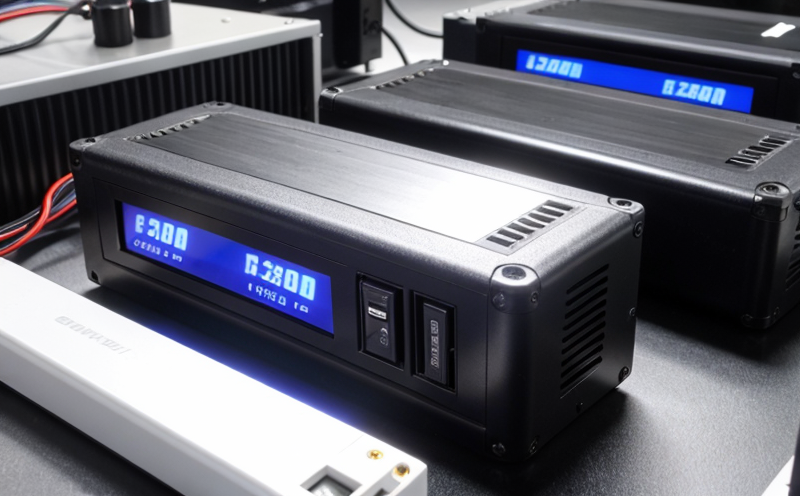IEC 62933-2-1 Electrical Energy Storage System Battery Performance Testing
The IEC 62933 standard series is pivotal in the testing and certification of batteries used in electrical energy storage systems (ESS). This service focuses on compliance with IEC 62933-2-1, which provides essential requirements for the safety, performance, and durability of ESS batteries. Our comprehensive battery cell performance testing ensures that your products meet these stringent standards.
Compliance with this standard is crucial as it not only guarantees product reliability but also enhances public confidence in energy storage solutions. In today’s rapidly evolving market, ensuring compliance can be a competitive advantage. This service helps our clients stay ahead by providing accurate and timely test reports that are critical for regulatory approval.
Our testing follows the prescribed procedures outlined in IEC 62933-2-1, which includes various tests such as electrical performance, thermal stability, mechanical durability, and safety checks. Electrical performance is evaluated through charging and discharging cycles to ensure that batteries meet their rated capacity accurately.
Thermal stability testing verifies the battery’s ability to withstand high temperatures without compromising its integrity or causing a fire hazard. Mechanical durability assessments examine how well the battery can handle physical stress, such as vibration and impact. Safety checks are performed to confirm that the battery meets all safety requirements specified in IEC 62933-2-1.
Our laboratory adheres strictly to these standards using state-of-the-art equipment and experienced personnel. We understand that the success of your product hinges on its ability to perform reliably under real-world conditions, which is why we go beyond mere compliance. Our team ensures that every test condition simulates actual usage scenarios to provide you with the most accurate performance data possible.
Compliance with IEC 62933-2-1 is essential for manufacturers of electrical energy storage systems who aim to enter global markets. The standard covers a wide range of applications, from residential solar power systems to large-scale grid storage projects. By ensuring compliance, our clients not only meet regulatory requirements but also enhance their brand reputation and market competitiveness.
Our service offers more than just testing; it provides a complete solution for manufacturers looking to ensure the safety, performance, and durability of their ESS batteries. With detailed reports that are aligned with IEC 62933-2-1, you can confidently present your products to regulatory bodies and potential customers.
| Applied Standards | Description |
|---|---|
| IEC 62933-2-1 | Essential requirements for safety, performance, and durability of electrical energy storage systems. |
The rigorous testing procedures we employ are designed to meet the highest industry standards. By working with us, you can ensure that your products not only comply with IEC 62933-2-1 but also exceed expectations in terms of performance and reliability.
Why It Matters
The importance of compliance with IEC 62933-2-1 cannot be overstated, especially for manufacturers of electrical energy storage systems. This standard is vital because it sets the benchmark for safety, performance, and durability in ESS batteries. Meeting these requirements ensures that your products are not only reliable but also meet global regulatory standards.
Compliance with this standard can significantly enhance public confidence in your brand by demonstrating a commitment to quality and safety. In an era where consumer trust is paramount, ensuring compliance can be a key differentiator in the competitive marketplace. Furthermore, it opens doors to international markets, as many countries have adopted IEC standards for regulatory purposes.
For R&D engineers and quality managers, compliance with IEC 62933-2-1 offers valuable insights into product performance under various conditions. This knowledge is crucial for continuous improvement and innovation within the company. Additionally, it allows procurement teams to source materials and components that meet these stringent requirements, ensuring consistency in product quality.
Failure to comply with these standards can lead to significant consequences, including legal issues, reputational damage, and potential financial losses due to recalls or product failures. By partnering with our laboratory for testing services, you can avoid these risks while gaining a competitive edge in the market.
Use Cases and Application Examples
- Solar Power Systems: Ensuring that batteries used in residential solar power systems meet safety, performance, and durability standards.
- Grid Storage Projects: Evaluating the reliability of large-scale grid storage solutions to support renewable energy initiatives.
- Electric Vehicles (EVs): Testing batteries for EVs to ensure they can withstand harsh environmental conditions while maintaining optimal performance.
- Data Centers: Confirming that uninterruptible power supply (UPS) systems are reliable and efficient in critical infrastructure environments.
In each of these use cases, compliance with IEC 62933-2-1 is crucial. The standard ensures that batteries perform consistently under various conditions, from extreme temperatures to high stress cycles. This consistency is particularly important for applications like grid storage and EVs, where reliability can mean the difference between success and failure.





